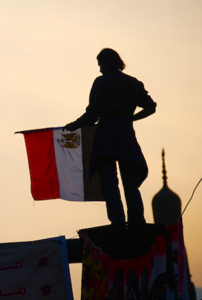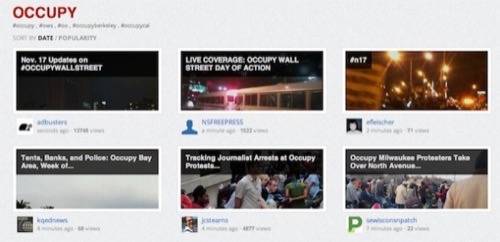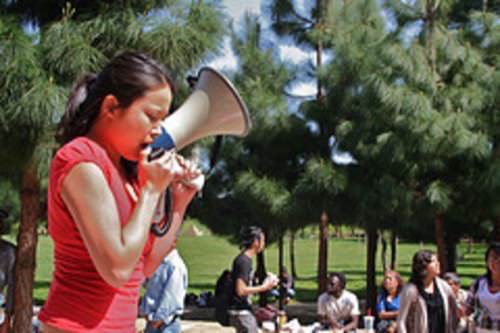To talk about the top trends on the Web as it relates to political unrest is a bit misleading. There were not trends, so much as there was the strengthening of a single trend that has been operant since before I started following online free speech in January of 2005. The tools of the social web have been used at a higher rate, and more in the public eye, than ever before, by both proponents, and opponents, of change.

The tug-of-war between governments and those agitating for change has been profound this year, and global. A case could be made that in 2011, those working for change have scored more points than their opponents. It’s important to remember, though, that the political struggle between those who wish to speak freely and those who wish to shut them up is like professional gambling. The overall chip count is what matters, not who’s up at any given point. The count overall remains dead even.
The two most visible expressions of this struggle in 2011 were the Arab Spring and the Occupy movement.
Arab Spring
Tunisia
On January 12, we wrote:
“Since a young Tunisian, Mohamed Bouazizi, set himself on fire on December 17 to protest conditions in his North African country, and the country went up in flames, most Western, and all American media, has been unearthly silent.”
Social media, especially Twitter, rushed in to fill the void. More than ever previously I, and many others, were getting their news on what was happening in the country, by consulting our Twitter accounts – and a lot was happening. This inspired a massive crackdown against social media by the government.

But it didn’t work. In fact, a grand total of two days later, ReadWriteWeb former France editor Fabrice Epelboin stated:
“This last week was one of the most intense moments for the French and Arabic social media sphere since the arrival of Web 2.0. The Tunisian revolution, which has been growing both on the ground and online since Dec. 17, came to a double climax. Yesterday, dictator Zine al Abidine Ben Ali announced the immediate end of all Net censorship and then released the last bloggers still in jail. Among them was Slim Amamou, a writer for ReadWriteWeb France and a national hero.”
A week later, the transitional government made Slim the nation’s minister of sports and youth.
Since then, the country has quietly transformed. Censorship still exists, though much less of it, and Islamists have made some gains, though not enough to have changed the nature of the country alarmingly.
Egypt
As the most populous, and arguably the most important, country in the Arab world, Egypt’s convulsions seemed to be the headliner to Tunisia’s opening act. Egypt’s young people had been using social media for some time. Facebook featured prominently in the April 6 Movement against a precipitous gain in bread prices. The country has a huge cadre of bloggers, some of whom have been blogging for nearly a decade. So when the Arab Spring raced into the streets of Cairo, Alexandria, Luxor and other cities in the ancient country, it went critical immediately.
The response by Hosni Mubarak’s governement was equally nuclear. They shut down their whole Internet. The exception to the shut down was a sub-branch that served banks and the military, but even that was eventually turned off, to the profound detriment of the economy. (This was not the first time a country had shut down its whole Internet. Burma did that in 2007.)
Nerds worldwide came to the rescue of on-the-ground Egyptian social media users. Not only did Egyptians and their friends and family outside the country pass information back and forth, the expatriates frequently serving as conduits for information to the outside world, but they also innovated work-arounds. Jacob Appelbaum, a hacktivist associated with Wikileaks, put together Internet dial up numbers for Egyptians to use. Brian of Conley of AliveIn and Small World Media set up a service via Google’s speak2tweet service to collaboratively translate phoned-in tweets from Egypt.

Egypt has fared less well than Tunisia in its new incarnation. Thousands of social media users and activists have been arrested by the reigning post-Mubarak military council. Recent elections have also seen a significant gain for both moderate and conservative Islamist parties.
The Arab Spring is far from over. But it’s going to be a stormier season than many had hoped early on, as, in addition to Tunisia and Egypt, Syria, Bahrain and Yemen and Morocco continue to prove.
#occupy
News, especially tech news, that occurs in the United States, always gets more attention than news elsewhere. The Occupy movement may have gotten more news than the Arab Spring, despite the profound difference in the stakes involved. (Before you throw a rod, read about Mona Eltahawy. She was one of the “lucky” ones.) That’s not to say #occupy is not important. Far from it. It indicates a groundswell, a powerful change not just in the U.S. but other countries. The Arab Spring might in the end be a global spring. (But don’t forget that Prague had one of those once.)

Given the fact that #occupy is a U.S.-born movement, hitting the planet near the nation’s financial font of Wall Street, and the U.S. is by some standards the most wired, most socially webbed country on the planet, the use of social media was profound.
A majority of the participants used smartphones and other devices to cover their own news at Occupy events across the country. The hashtags #ows and #occupy quickly came to the fore. Videos, audio, photos and other media provided a tide of impressions and data points to observe.
In fact, a number of representatives of U.S. law enforcement requested that Google remove videos of alleged police brutality from its YouTube service. Google refused.
Social Flow graphed the manner in which the idea of “occupy” moved in time over Twitter in a fascinating, and extensive, graphic.
Although the intensity of repression against the #occupy protesters in the U.S. is only a hint of what it was against Egyptian protesters, both before and after Mubarak was shown the door, it remains a difference in quantity, not quality. The New York Police Department was tasked with shutting down press coverage of the protests. And, like Egypt discovered, information is a bitch to stop in a data-saturated environment like the present.

Although mainstream media reporters were frequently blocked, it was impractical to stop all the social media flowing out of Zucotti Park in November. Those outside the park began to utilize the curating tool called Storify to aggregate, filter, cohere and communicate that flow of information. In the end, at the beck and call of the city’s bosses, the NYPD was able to register a bone-rattling blow against their own credibility but not against news.
Conclusion
The top trend at the intersection of the social web and political unrest is the eternal tug-of-war between those who would register their voices and those who would deny them. I am aware of how simplistic this sounds, but would also insist that 2011 was one of those years in which the simple was true.
You don’t have to like the protesters of the Arab Spring. You might fear their actions will lead to an increasingly Islamacised Middle East, one whose future is yoked to an ideology where the very free speech that gives birth to it is mercilessly muzzled. You might think the youth of the protesters will put them in a position of international weakness if when and if they do take power. There are indications that both of those fears are not without some validity.

You might find the vagueness of the #occupy protesters useless and their antics conducive to nothing more than self-aggrandizement and chaos. You might find their claims to being the “99 percent” laughable or their anti-corporate stance (logged on devices made or powered by some of the world’s largest corporations) laughable.
You may believe that the relationship of both these groups toward the technology they use to border on idolatry
It doesn’t matter. Because in the end, you believe the world is better off when ideas are audible (visible, readable) than when they are hidden, the province of a priesthood. If you believe the former, you celebrate the technology that allows the amplification of those voices. If you don’t, you discount it, or believe it vile. There’s a whole lot more to it, but it starts with this:
Speak, or don’t speak. I say speak. And so, this past year, has the world.
Megaphone photo by Andrew Alio

















